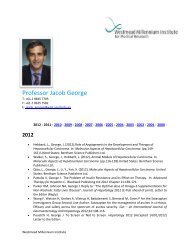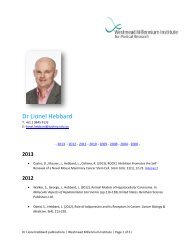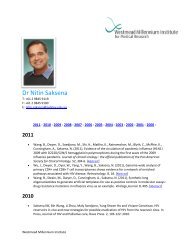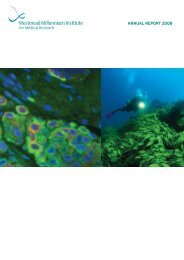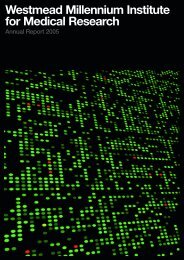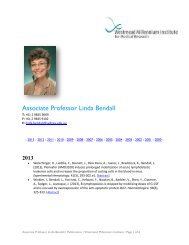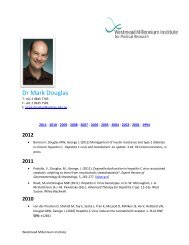Translating >> - Westmead Millennium Institute
Translating >> - Westmead Millennium Institute
Translating >> - Westmead Millennium Institute
- No tags were found...
Create successful ePaper yourself
Turn your PDF publications into a flip-book with our unique Google optimized e-Paper software.
10 11 > Overview // AR 2006<br />
Infection and Immunity<br />
We are examining important viruses and bacteria and how they interact<br />
with the immune system. We are also looking at how to manipulate the<br />
immune system for transplantation.<br />
s<br />
s<br />
The Infection and Immunity division is investigating serious<br />
infectious diseases and pathogens, oral infection, organ<br />
transplantation, autoimmunity and other immune disorders.<br />
The Centre for Infectious Diseases and Microbiology<br />
conducts research on the identification, treatment and<br />
prevention of serious infectious diseases. It also provides<br />
training and education to health care professionals, patients<br />
and the community in managing the spread of these diseases.<br />
A major research area is concentrating on Cryptococcus,<br />
a fungus that causes meningitis and other brain and lung<br />
infections. Researchers aim to define how the organism enter<br />
s<br />
11<br />
Peptide C<br />
the body and triggers the disease to develop new treatments<br />
against it.<br />
Work over the past year has provided further insight into<br />
how a recently discovered enzyme, phospholipase B (PLB),<br />
enables Cryptococcusto to penetrate a patient’s tissue.<br />
As investigations progress, researchers hope to use PLB<br />
as a target for new drug treatments that may eliminate<br />
cryptococcal infection and several other important fungibased<br />
diseases.<br />
Research in new antifungal drug treatments has led to the<br />
identification of three classes of drugs that may inhibit the<br />
effect of PLB. One of these drugs, Miltefosine, is already<br />
being used in developing countries to kill a parasite that causes<br />
leishmaniasis. Laboratory tests have also shown Miltefosine to<br />
kill a number of fungi, including those resistant to available<br />
drugs. The centre aims to improve Miltefosine’s effect while<br />
reducing some of its current side effects. Collaborations are<br />
being sought overseas to conduct a trial of Miltefosine to<br />
treat cryptococcosis, which has become a major problem for<br />
patients with AIDS in developing countries.<br />
B<br />
A<br />
With the support of a five-year NHMRC Centre of Clinical<br />
Research Excellence (CCRE) grant (2005-09), research<br />
continues to improve outcomes for immunocompromised<br />
patients with blood malignancies. One new strategy aimed<br />
at bone marrow transplant patients is investigating the effects<br />
of vaccinating bone marrow donors’ cells so that immunity<br />
can develop before the transplant takes place, reducing the<br />
recipient’s risk of infection following the procedure.<br />
This year, the centre began the Community Respiratory Virus<br />
Project to understand how coughs, flu, colds, bronchitis or<br />
pneumonia are being transmitted in the hospital wards to<br />
patients with blood malignancies or who are undergoing<br />
transplants. Results so far have been very positive with some<br />
transmission patterns being identified between patients, their<br />
families and staff. This has led to strict protocols being set<br />
(including a flu vaccination program for patients and their<br />
families) to prevent the spread of flu and other respiratory<br />
viruses. An education program developed for patients and<br />
their families has successfully incorporated information about<br />
the impact of these infections upon the patients.<br />
Over the past year, researchers working in rapid diagnostics<br />
have characterized a new antibiotic resistant gene relevant to<br />
serious infections in Australian intensive care units (ICUs).<br />
Using newly created procedures for analysis, researchers<br />
hope to simultaneously identify bacteria causing disease and<br />
the genes associated with their resistance. These advanced<br />
diagnostic methods will mean strategies can be implemented<br />
faster than currently possible to prevent bacteria from<br />
being transmitted to ICU patients, and treatments can be<br />
administered more rapidly in the event of infection.<br />
The Centre for Transplant and Renal Research is<br />
internationally reputed for its investigations into causes,<br />
treatments and cures for progressive renal disease and<br />
transplantation.<br />
More than 150,000 Australians have Type 1 diabetes (also<br />
known as juvenile or insulin-dependent diabetes). These<br />
patients are at risk of developing serious complications<br />
including kidney failure. If diabetic control can be improved<br />
then the incidence of these complications can be reduced.<br />
The centre proposes a radically new treatment where blood<br />
sugar levels are nomalised by transplanting the insulin<br />
producing cells, rather than using the imperfect treatment of<br />
insulin injections.<br />
s<br />
s<br />
21<br />
The centre is continuing to make important breakthroughs<br />
in this field of study, which includes investigations of<br />
human pancreatic islet cell transplantation to patients and<br />
the production of alternative sources of islet cells through<br />
xenotransplantation – the transplantation or grafting of cells,<br />
tissues and organs from one species to another.<br />
Researchers at the centre were the first to establish a successful<br />
clinical pancreatic islet cell transplant program in Australia<br />
proving that infusing patients with these cells provides<br />
much better control of diabetes than the traditional insulin<br />
injection therapy.<br />
COOH



